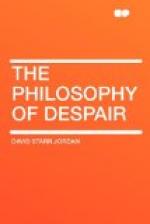In the presence of the infinite problem of life, the voice of Science is dumb, for Science is the coördinate and corrected expression of human experience, and human experience must stop with the limitations of human life. Man was not present “When the foundations of the Earth were laid,” and beyond the certainty that they were laid in wisdom and power, man can say little about them. Man finds in the economy of nature “no trace of a beginning; no prospect of an end!” He may feel sure, with Hutton, that “time is as long as space is wide.” But he cannot conceive of space as actually without limit, nor can he imagine any limiting conditions. He cannot think of a period before time began, nor of a state in which time shall be no more. The mind fails before the idea of time’s eternal continuity. So time becomes to man merely the sequence of the earthly events in which he and his ancestors have taken part. Even thus limited it is sadly immortal, while man’s stay on the earth is but of “few days and full of trouble.” “Oh, but the long, long while this world shall last!” or as the grim humorist puts it, “we shall be a long time dead.”
Though the meaning of time, space, existence lies beyond our reach, yet some sort of solution of the infinite problem the human heart demands. We find in life a power for action, limited though this power may be. Life is action, and action is impossible if devoid of motive or hope.
It is my purpose here to indicate some part of the answer of Science to the Philosophy of Despair. Direct reply Science has none. We cannot argue against a singer or a poet. The poet sings of what he feels, but Science speaks only of what we know. We feel infinity, but we cannot know it, for to the highest human wisdom the ultimate truths of the universe are no nearer than to the child. Science knows no ultimate truths. These are beyond the reach of man, and all that man knows must be stated in terms of his experience. But as to human experience and conduct, Science has a word to say.
Therefore Science can speak of the causes and results of Pessimism. It can touch the practical side of the riddle of life by asking certain questions, the answers to which lie within the province of human experience. Among these are the following:
Why is there a “Philosophy of Despair?”
Can Despair be wrought into healthful life?
In what part of the Universe are you and what are you doing?
Personal despair or discouragement may rise from failure of strength or failure of plans. This is a matter of every-day occurrence. The “best laid schemes o’ mice and men " generally go wrong, no doubt, but this fact has little to do with the Philosophy of Pessimism. It is natural for mice and men to try again and to gain wisdom from failures. By the embers of loss we count our gains.”
The Pessimism of Youth we may first consider: In the transition from childhood to manhood great changes take place in the nervous system. There is for a time a period of confusion, in which the nerve cells are acquiring new powers and new relations. This is followed by a time of joy and exuberance, a sense of a new life in a new world, a feeling of new power and adequacy, the thought that life is richer and better worth living than the child could have supposed.




